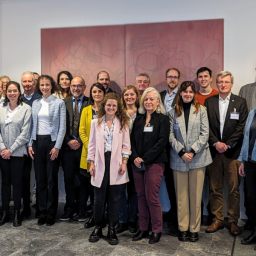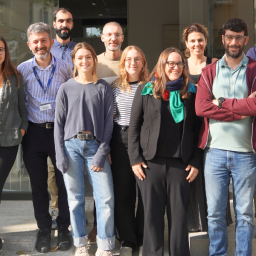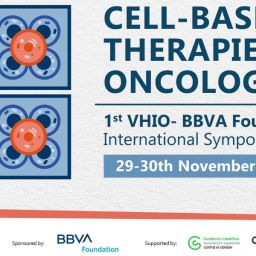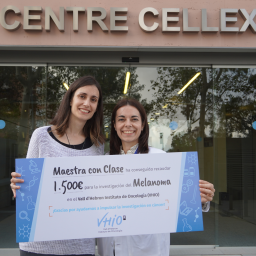
Now published in Annals of Oncology (1), updated meta-analysis provides insights into the efficacy of adoptive cell therapy with tumor-infiltrating lymphocytes (TIL-ACT) in advanced melanoma patients who had received prior treatment with immune checkpoint inhibitors (anti-PD-(L)1) or not.
Building on their previously published data (2), findings from this present study, first authored by Silvia Martín-Lluesma, Head of VHIO’s Advanced Therapies Program, conclude that previous immune checkpoint blockade has no significant effect on clinical response or benefit from TIL therapy in patients with advanced cutaneous melanoma.
Cell therapy development
Over the past two decades, the explosion in the development of immunotherapy has led to an expanding array of powerful anti-cancer armory. By harnessing the immune system against cancer, these therapies have changed the treatment landscape across several tumor types. “Despite the remarkable results for some patients, only a limited number of patients respond to immune checkpoint inhibitors. These treatments can activate a wide range of immune cells but can unfortunately sometimes trigger auto-immune reactions. The development of more personalized cancer immunotherapy therefore represents a clinical priority toward more effectively combating cancer,” said Silvia Martín-Lluesma
Advanced cellular therapies are currently being developed to redirect immune cells to boost antitumor immunity and more effectively eliminate cancer cells. Among these potential contenders, tumor-infiltrating lymphocytes (TILs) use a patient’s own immune system T cells to combat this disease. TILs are extracted from a patient’s tumor, activated and expanded in the laboratory and introduced back into the patient to attack tumor cells.
“Adoptive cell therapy with TILs has shown efficacy in advanced melanoma. This present study was designed to assess overall survival after TIL therapy as well as the effect of prior anti-PD-(L)1 therapy on its efficacy,” added Martín-Lluesma.
The investigators analyzed the overall survival and objective response rates of 617 patients who participated in 13 studies with TIL therapies, reported in the literature. They observed no significant differences in overall survival between patients who had received prior treatment with immune checkpoint inhibitors and those who had not, with a median of 17.5 months versus 16.3 months. No significant difference was found in objective response rate which was 34% and 44% in patients with and without prior anti-PD-(L)1 therapy, respectively.
Furthermore, based on data from over 600 patients with metastatic melanoma, the results of this study confirm that treatment efficacy is not affected by TIL production methods, whether newer (“young TIL”) or traditional approaches. Results of this present study provide important insights for international projects (co) led by VHIO as part of our Advanced Therapies Program: PragmaTIL (https://pragmatil.eu/) and JOIN4ATMP (https://join4atmp.eu/).
“Findings from our updated review and meta-analysis reinforce the evidence that TIL-ACT should be considered as a treatment of choice in second-line for metastatic melanoma patients who do not respond to prior treatment with anti-PD-(L)1 therapy. Further studies are warranted to evaluate whether TIL-ACT should be proposed as front-line therapy in melanoma patients,” concluded Silvia Martín-Lluesma.
VHIO’s Advanced Therapies Program is supported by the BBVA Foundation Comprehensive Program of Cancer Immunotherapy and Immunology (CAIMI), a VHIO Institutional Program supported by the Fundación BBVA, one of our private patrons, and institutional funding received from the Asociación Espanola Contra el Cancer – AECC (Spanish Association Against Cancer) Excellence Program – Advanced Therapies Accelerator Program.
VHIO’s translational research model
VHIO’s Advanced Therapies Program further strengthens our multidisciplinary and translational research model. VHIO investigators are dedicated to improving the prevention, early diagnosis and treatment of cancer by transforming the latest scientific discoveries made in the laboratory into early phase clinical trials for the development of more effective therapies to improve the quality of life and survival of cancer patients.
In recognition of its purely translational research model and expertise and leadership in clinical trials—especially in early phase studies with investigational therapies—VHIO is the first research center linked to the Spanish national healthcare system to have received accreditation as a Severo Ochoa Centre of Excellence (2022-2026).
###
References
-
- Martín-Lluesma S, Svane IM, Dafni U, Vervita K, Karlis D, Dimopoulou G, Tsourti Z, Rohaan MW, Haanen JBAG, Coukos G, Efficacy of TIL Therapy in Advanced Cutaneous Melanoma in the Current Immuno-oncology Era: Updated Systematic Review and Meta-analysis, Annals of Oncology (2024), doi: https://doi.org/10.1016/j.annonc.2024.07.723.
- Dafni U, Michielin O, Lluesma SM, Tsourti Z, Polydoropoulou V, Karlis D, Besser MJ, Haanen J, Svane IM, Ohashi PS, Kammula US, Orcurto A, Zimmermann S, Trueb L, Klebanoff CA, Lotze MT, Kandalaft LE, Coukos G. Efficacy of adoptive therapy with tumor-infiltrating lymphocytes and recombinant interleukin-2 in advanced cutaneous melanoma: a systematic review and meta-analysis. Ann Oncol. 2019 Dec 1;30(12):1902-1913. DOI:https://doi.org/10.1093/annonc/mdz398























